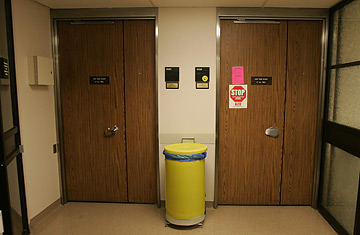
Rooms at National Jewish Hospital in Denver similar to the one that will be given to the 31-year old tuberculosis patient who has contracted XDR TB, a rare form of the disease.
Infectious diseases are a scary thing, and even scarier is the prospect of exposing yourself to a potentially deadly disease simply by going on vacation. Officials from the Centers for Disease Control are still trying to track down some 80 passengers who may have been exposed to drug-resistant tuberculosis by a man flying on commercial flights to and from Europe earlier this month. So far, a handful of those travelers have contacted the CDC to undergo the first of two tests for the disease, and the patient himself was moved today to National Jewish Hospital in Denver, where he will receive treatment. (The hospital has successfully treated two other patients with similar strains in recent years.)
It might seem that after the threats of bioterrorism, and after the spread of HIV and SARS in recent decades, public health officials would be better prepared — and more coordinated — when it comes to dealing with nasty bugs that hitch rides from country to country in often unsuspecting plane travelers. But this latest TB scare illustrates that the system still has a long way to go to be able to deal effectively with such health crises.
On May 25, 31-year old Andrew Speaker disobeyed CDC officials when they contacted him during his trip in Rome and asked that he remain in the city until special transport could be arranged. It was then that an official for the U.S. health agency informed him that his TB was not only resistant to multiple drugs, as he had initially been told before he left for Europe, but was also considered "extensively resistant" to drugs (XDR), meaning most first-line and second-line drug treatments might be ineffective.
At that point, he told the Atlanta Journal Constitution, he decided to bypass the CDC's efforts to find care and transport for him and instead returned to the U.S,. via Prague and Montreal. He came back, he said, so he could get the best treatment for his condition. According to new reports, Speaker's father-in-law is himself a microbiologist at the CDC.
Should the CDC have moved more quickly and issued a more unequivocal order for Speaker not to travel? "We try to balance individual freedoms with the public good, and that depends on a covenant of trust," says Dr. Martin Cetron, CDC's director of global migration and quarantine. "There were several communications between my staff and individuals in Rome, begging him to stay put and not travel while we worked on options for him."
Fortunately, say CDC experts, Speaker does not seem extremely contagious; while lab tests for the tuberculosis bacterium are positive, he has not yet produced evidence of the bug in his sputum, and, at last report, was not coughing. Still, erring on the side of caution, the U.S. health agency is offering every passenger on the two international flights taken by Speaker the opportunity to get tested.
The CDC is starting with those people who had the closest contact with him — passengers sitting two rows in front and two rows behind him. But as the CDC's director of global migration and quarantine noted, accessing this information remains a challenge. According to protocol, passengers need to be contacted initially by the health department of their country of citizenship. "It takes time," says Dr. Martin Cetron, of the CDC. "It takes longer than we like, and I hope this system is fixed and improved in the future."
